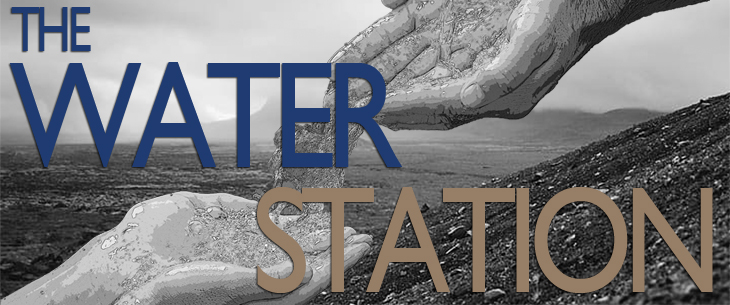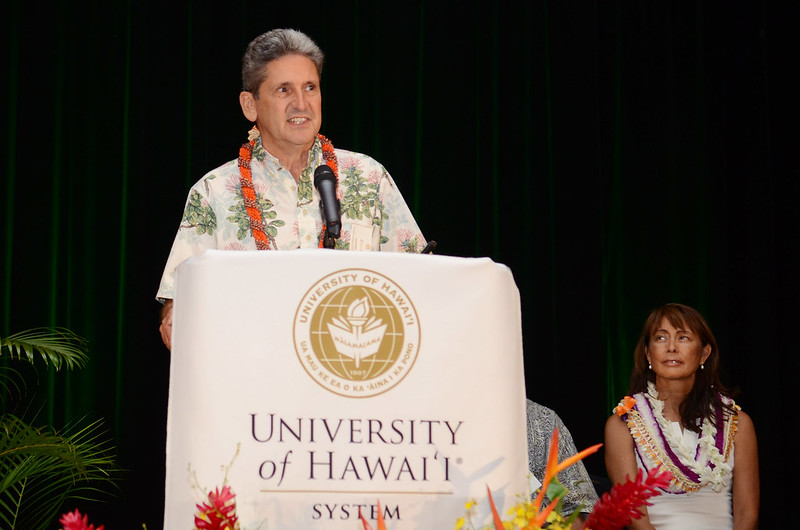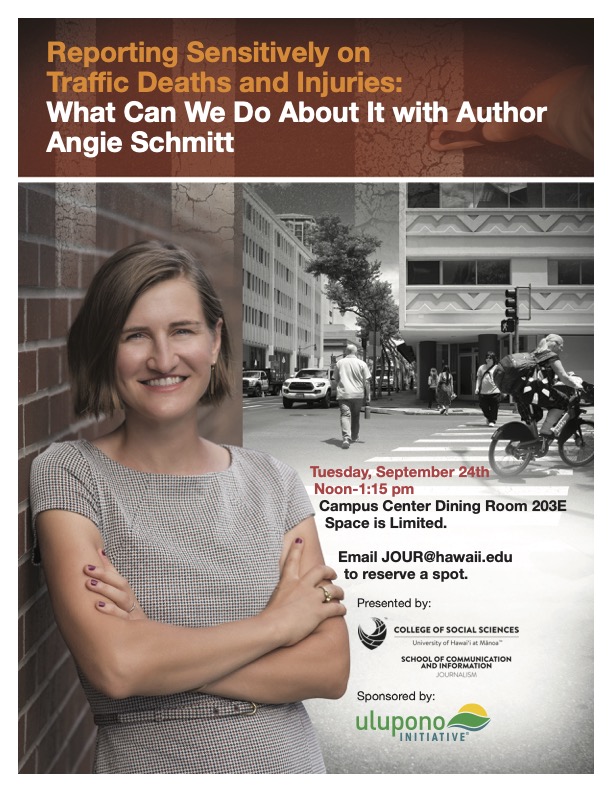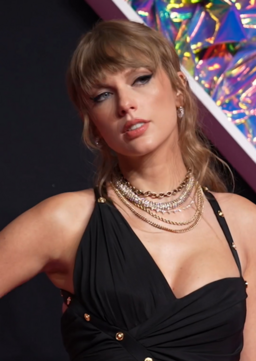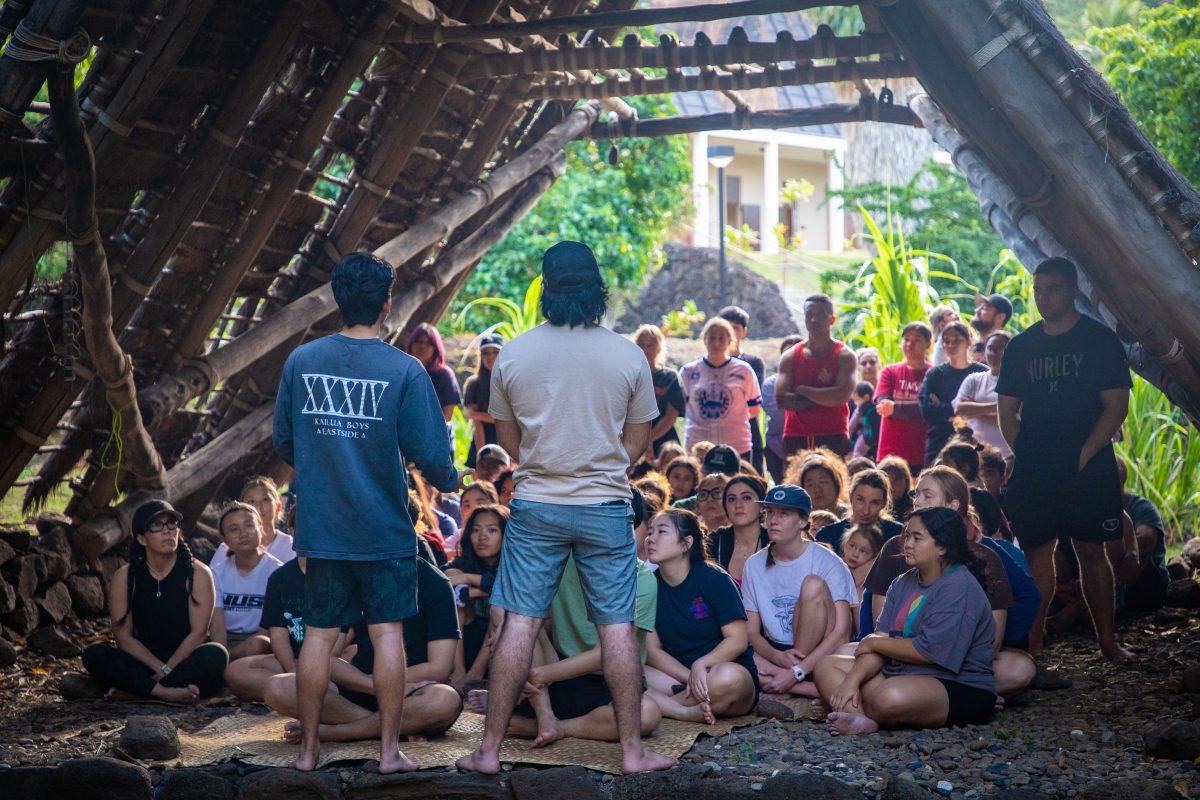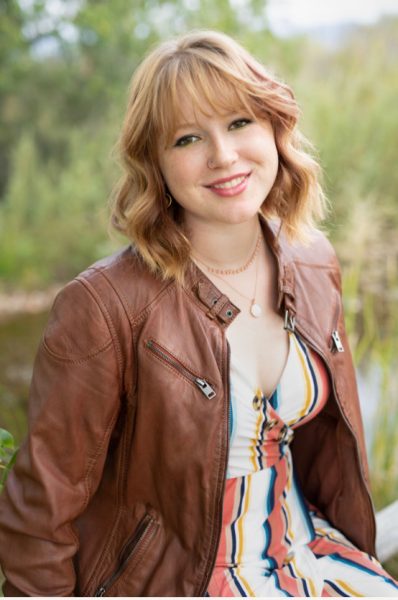Graduate student Marguerite Saxton is no stranger to performances without words. Her background in circus performance enables her to convey complex themes without the traditional use of language. Her latest production, The Water Station by Ōta Shōgo, shows the stories of several travelers as they find a respite from a war-torn landscape. The play encourages viewers to examine their own journeys in the modern world. The Water Station was on stage from November 15 – 19, 2023 at Kennedy Theatre. In an interview with the Mirror, Saxton revisits her personal journey that led to these performances and shares what the play means to her.
How old are you, where are you from, and how long have you been attending UH Mānoa?
I’m 38 — I started graduate school at UH Mānoa during fall 2021. I grew up in a military family, but I spent a lot of my formative years in Tucson, Arizona. I grew up in a really tiny town just north of Mexico called Sahuarita and then eventually migrated a little bit further North to Tucson, which is a little more happening and less people riding horses.
How long have you been participating in theater?
I’ve been involved in theater for 30 years. I started as a kid, I was living in Washington DC, that’s where I spent my childhood years, and I started at the age of eight. I was performing in community theater. In my first role, I was a french maid who died. I eventually kind of segwayed from performing in straight plays and later joining the circus. I was in the Bay Area in the circus for many years. I then sort of pivoted again and got more interested in the technical, directive side. It was in my late 20’s and early 30’s that I really stepped into that arena with more gusto.
What did you do in the circus?
I was a hula hooper, and I have also studied contortion. So these are things that I still have as hobbies, but I’m not performing with them. We did fire circus as well.
In the director’s note of the program for The Water Station, you talk about how Shōgo’s work immediately drew you in. Why was this?
I, as a creator, have always resonated with or connected with wordless theater. In my pursuit of finding things that I wanted to direct, when I came across his work I was sort of side swiped. I felt like there was a person who was brave enough to make an hour-long show with no words, and really challenge the status quo on audiences’ comfort level, which is something I’m also really intrigued by. And then I just sort of started exploring more and getting more into the realm of his philosophy. He’s done a lot of writing on his philosophy, it’s very spiritual, it’s very thoughtful, and super holistic. So nothing that comes out of his plays is just there, it’s all very related and effective and I found that to be comforting on some level. Like this person has really poured his heart and soul into this work. It felt exciting and fresh to me. And this is not new; it’s coming from the 60’s originally, that’s when [Shōgo] kind of came up in Japan. But it’s new in the sense that it’s not been heavily produced.
Have you ever worked on a wordless production in the past?
Yeah certainly, a lot of circus is wordless, even if it’s gibberish. I always found myself striving to remove as many words from any production that I was given. Once I got to grad school I was like ‘I don’t like all these words!’ Certainly, but this is the longest one I’ve done, it comes in at about an hour.
How long have you been working on this project?
I’ve been working on this project for a long time, over a year. I don’t know if you consider that a long time. Artists and directors, when we find things we want to work on, we develop shows for 5 years or whatever. But I was working on this particular show for about a year, meaning like research. Ōta Shōgo has passed away, so that was challenging. Obviously I can’t write him, and ask if I can do his show. Everything was produced in Japan in the 80’s, so it’s not super streamlined like, “Oh let’s just hop on this website!” It took a lot of work to connect. I was able to finally connect with his widow who gave me permission to produce the show. It was a year of research, pitching this to my advisor committee, getting approvals, and working within the production calendar. I went to Japan over the summer to do research as well.
Why intrigued you most about The Water Station over other works by Shōgo?
It was a hard decision to make. Ultimately, Shōgo’s work challenges a lot of people in a lot of ways. And this was the first play in a series of 6. So I thought, “This is already going to be challenging for the audience, which I’m okay with. But how can I be a little tender towards them and help them out to digest what’s going on?” I found that the entry point, for me, was Water Station I. And then moving on from that you can start to investigate Water Station II, Earth Station, Wind Station, and then learn about his company and all these things. So yeah, I kind of felt like it was a good entry point into his work.
In a play without words, what were some of the challenges that you and your troupe faced and how did you overcome these challenges?
I, personally, was not extremely challenged just by no words because it’s something that I really love. Of course I was challenged by many other things. But I think one of the biggest things out of the whole troupe’s experience was trusting that there was a story to tell, and trusting that they could tell it with their bodies.
There’s a huge range of experience, from very seasoned performers who are currently performing in other things, then some who haven’t performed in 20 years, and some haven’t really performed in more than a handful of productions in their lives. So it’s like this massive range, and some people were nervous to go up there and do things for an hour. They’re very accustomed to using words as a crutch; they didn’t have that crutch this time.
What were some of the challenges that you faced personally?
I think it was finding ways to connect with every different type of performer that was on my cast because it was such a huge range. There were some performers who I’d worked with before, so I kind of already knew their language, so to say. But there was a couple and I didn’t know their language. I felt like I really had to dig deep to understand how they needed to be connected with.
What was the casting and rehearsal process like for this production?
It was tough because we’re working within the confines of UH, and we don’t have a huge program. We just don’t have a ton of dancers or a ton of actors in our program. And then those that we do have, they take other classes and stuff like that. I reached out to community members as well. We’re allowed to bring community members into our plays. I ended up finding the absolute perfect people. It just all worked out. I had one round of auditions in May or the end of April, and then I had another round of auditions in August.
In your director’s note you talk about feeling like an outsider in theater and how Shōgo’s work made you feel at home. Can you elaborate on this?
Coming from my background, I don’t have a traditional theater background. Yes, I started performing very young but I kind of went rogue and then did circus life, which is not the traditional trajectory. It was reflected back to me that my life wasn’t super normal. I didn’t even think about it. But come to find out, running away and moving to San Francisco to join the circus isn’t what everybody does. So I felt like I was at a disadvantage in a way because I didn’t have all that academic theatrical training. I had very practical, on the road, “let’s make this show happen”, punk rock, burning man kind of training, which is super valuable, but I couldn’t put it on a resume and have somebody say, “Oh, she’s qualified.”
So, I had felt like an outsider in that sense. Eventually I realized that it’s working to my advantage in a lot of ways. But it was hard to get somebody to trust that I was worthy enough to invest in, to take me to graduate school and to give me that chance. Like, “Who is this circus chick? She wants to be a director?” But I had that passion the whole time, it just maybe didn’t look like it on paper. My work is just distinctively different from other people at UH and I don’t mean that as a brag, I mean it as something that I was actually really insecure about. But I have felt like an outsider, I am an outsider. I’ve learned and accepted that my work is great; it’s just different.
What is your personal interpretation of The Water Station?
So a lot of Shōgo’s philosophy has to do with Daoism and the way we cycle through our life. It has to do with the treatment of elders. He has lots of commentary on how we treat the elders in our society; how we treat people. I see this play as a gigantic metaphor for existing, and people who are existing in a migration space. They’re not homeless, they had lives, they had community, they had families. Because this is roughly based on his repatriation journey, which was a very real experience for many people post-World War II. There’s commentary on war, on loneliness and with what we’ve gone through with COVID-19, and how so many people are still in a phase of migration. If, for instance, they lost their jobs, or a family member died or if they got major health complications, they’re still on that migration journey even if they’re not wearing a backpack or getting water from a tap on a road. It’s a huge metaphor! Many, many metaphors put together to form one giant metaphor.
Did you and your troupe discuss the emotional significance of this play during the rehearsal process?
Certainly. In the beginning couple weeks of rehearsals, we actually started with doing yoga all together over the summer to get physically ready for what was to come. After we had cast our final members, we began with just, sort of, talk rehearsals. People had a lot of questions. If you see the script, it’s actually written like a poem. It’s hard to decipher. There’s a lot of actual negative space on the page where there’s nothing being said. A lot is happening. We spent a considerable amount of time sitting together, answering questions, talking about how it made us feel, talking about if there were moments that were uncomfortable for us. We talked about how to navigate those feelings in a group space, which ultimately was a good move because my cast has gone on to be so supportive of each other, and just amazing with one another in that regard.
What do you hope that your audience will take away from this experience?
I would say curiosity. If you don’t fully understand all of the things, if you’re still interested enough or open-minded enough to investigate, and if you’re actually curious enough to be okay with not getting all those answers, like we’re kind of accustomed to in theater. Yeah, I’d say curiosity.


